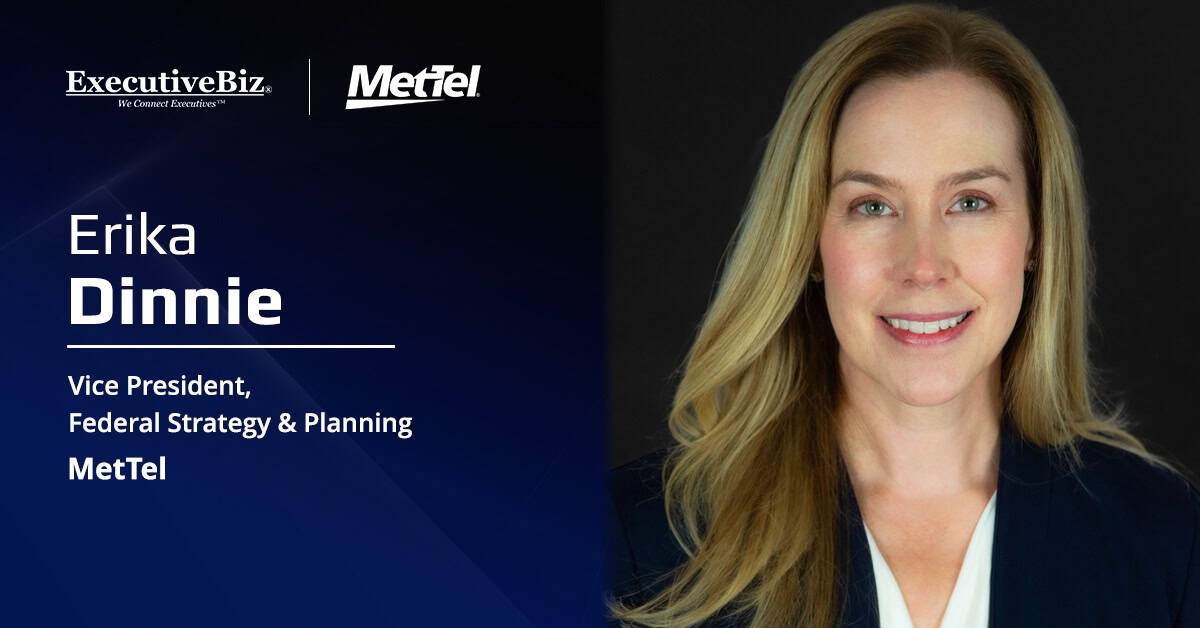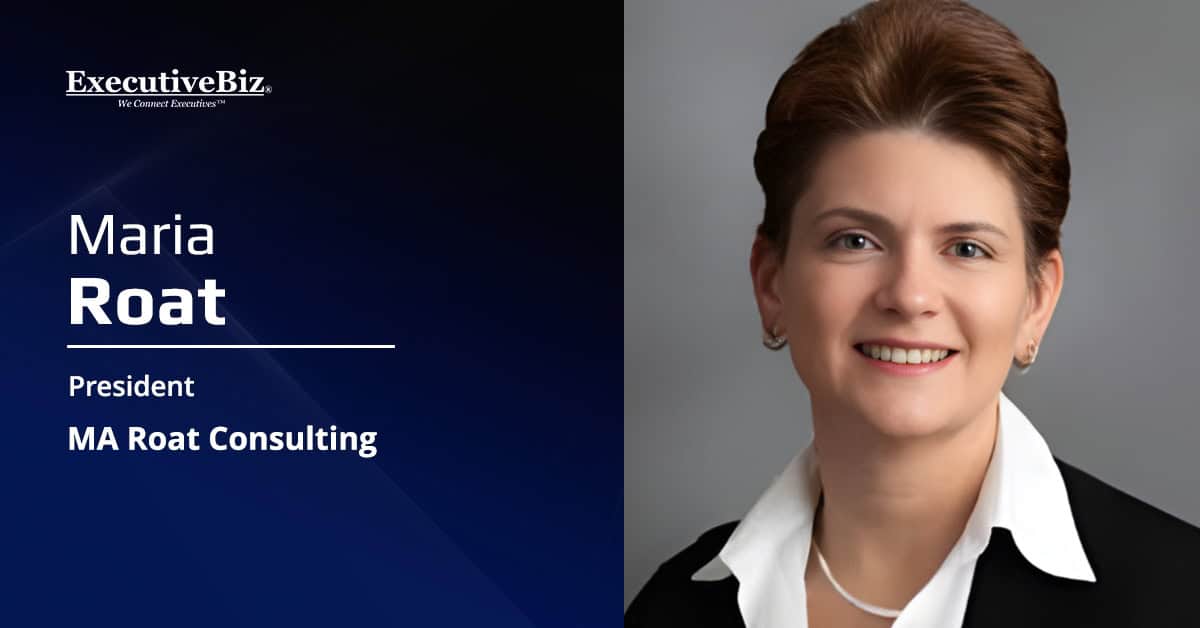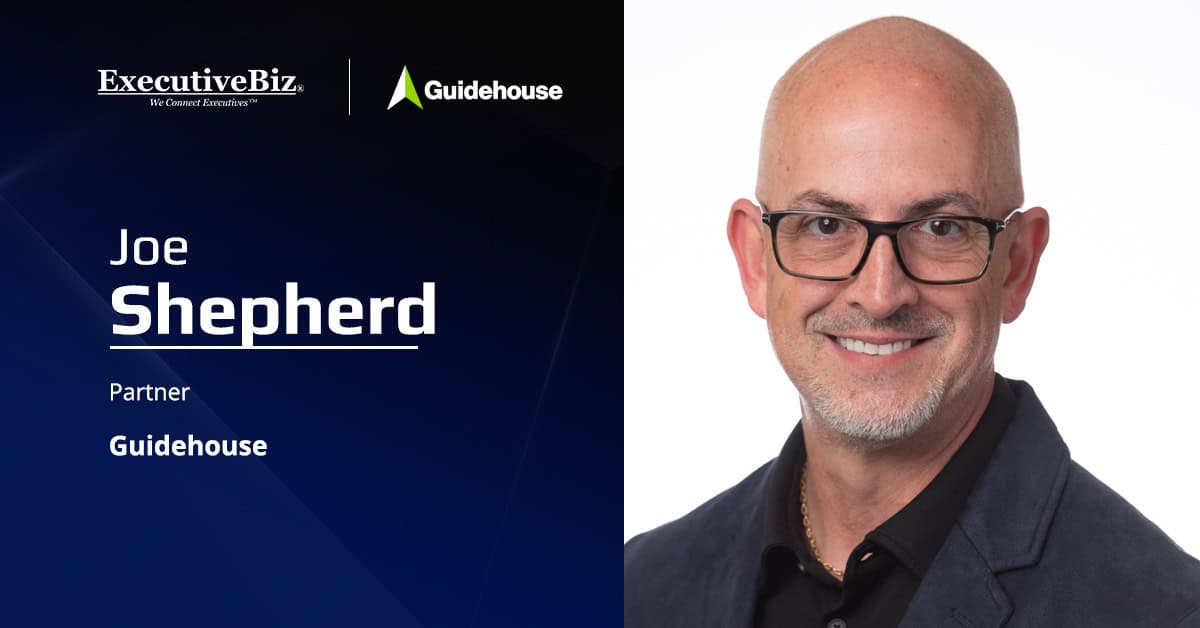Erika Dinnie, MetTel vice president for federal strategy and planning, thrives in change. Before starting at MetTel in April, she spent 20 successful years in a variety of roles in the federal government ranging from legislative affairs to IT and commercial real estate.
Dinnie previously served as the General Services Administration’s associate chief information officer for digital infrastructure technologies for nearly 10 years, overseeing GSA’s IT infrastructure, systems, software and applications. She also served as assistant commissioner and head of workplace services of GSA’s Public Buildings Service from 2011 to 2014.
Dinnie now brings her skills serving dynamic federal clients and their competing priorities to MetTel. She recently sat down with ExecutiveBiz for her first Spotlight interview, sharing her perspective on new government contracting reform prioritizing performance-based outcomes, reimagining service delivery through AI and cybersecurity and the best way to build relationships with federal agencies.
Learn more about how the DOD is leveraging AI in its daily work at the Potomac Officers Club’s 2025 Navy Summit on August 26! Discover new requirements at the “Optimizing Navy Decision-Making with GenAI: Balancing Human Insight with AI Precision ” panel discussion. Strike up collaborations with other GovCon titans and score that big contract. Sign up today for this prestigious GovCon conference specifically designed for technology professionals!
ExecutiveBiz: How is tariff uncertainty impacting MetTel?
Erika Dinnie: Tariff uncertainty can present challenges for any organization, but MetTel is in a somewhat unique position to overcome it. Much of our business involves sourcing hardware to support networks and internet of things solutions, and a significant portion of that hardware comes from international suppliers. This can impact deployment schedules and infrastructure projects, such as our software defined-wide area network, or SD-WAN, rollouts.
One of our competitive advantages, however, is our ability to remain price-competitive, which requires careful pre-planning to manage cost predictability and build flexibility into our pricing models. Supply chain strategy is also critical—MetTel maintains warehouses across the country, which helps mitigate disruptions.
Ultimately, our lean and agile operating model is a real strength. It enables us to adapt quickly, maintain timely delivery and navigate market fluctuations effectively
EBiz: How is MetTel adjusting to contracting reform targeting companies that typically operate based on hours worked, rather than outcomes achieved?
Dinnie: MetTel has always focused on outcome-based services rather than time-and-material or hourly models. That said, we’re seeing a broader industry shift toward performance-based approaches, and while we already deliver managed services and turnkey telecom solutions, it’s pushed us to sharpen our focus on measurable results.
We place a lot of emphasis on performance indicators—things like network uptime, user satisfaction and mean time to resolution. Service level agreements, or SLAs, are central to that, but so is demonstrating the value behind those outcomes. In a competitive market, agencies want to see exactly what they’re getting from the service.
For example, we’ve invested in automation and tools like our Bruin platform, which provides real-time analytics and AI capabilities for managing a network or telecom portfolio. These kinds of value-add features help us stay competitive while offering benefits that our competitors may not provide.
Ultimately, we’re built around delivering outcomes—not just hours worked. As the government moves further toward performance-based contracts, it pushes us to be even more precise and innovative in how we deliver those outcomes.
EBiz: What’s the most impactful trend you’re seeing in the GovCon market and how are you seeing GovCon firms respond to that trend?
Dinnie: When you talk about trends, you really can’t ignore the push to centralize procurement through GSA. That mandate is something we’re tracking closely and it’s important to make sure we’re well positioned to compete through the GSA contract vehicles available.
That said, I think the bigger trend is the shift from simply modernizing legacy systems—which the government has been doing for decades—to reimagining service delivery through AI and cybersecurity. This spans everything from everyday tools like chatbots that help citizens access services, to large-scale systems like national defense networks or air traffic control.
We’re seeing AI and cybersecurity become embedded in performance-based, outcome-driven contracts, reinforced by executive orders and policy guidance. At the same time, there’s strong pressure from the administration to improve efficiency, reduce costs and increase transparency. That combination is pushing vendors to integrate AI and zero trust principles into their solutions as a core part of their competitive strategy.
Dig into opportunities for GovCons to reduce costs and improve efficiency through cybersecurity at the Potomac Officers Club’s 2025 Navy Summit on August 26! Hear the latest in cyber partnership opportunities during an illuminating fireside chat by Navy CIO Jane Rathbun! Check out the newest offerings from leading sponsors including SAIC, Fortress and Vultron. Secure your seat today and get an edge on your GovCon competition!
EBiz: Can you tell me a little bit about this cost and transparency emphasis that the government is putting on now? How are you complying with these?
Dinnie: I think the key is to use cost scrutiny and accountability as a competitive advantage, rather than just seeing them as compliance requirements or the cost of doing business. That focus on cost and accountability often makes the difference between winning and losing bids.
Additionally, agencies are increasingly looking for vendors who can demonstrate they can implement AI reliably and safely. Being able to prove strong performance in that area will be a major advantage.
So the strategy for success is not just about offering a SLA, but also about proving you can consistently deliver on it.
EBiz: You recently joined MetTel after a long federal career at GSA. What’s your forecast for the GovCon market over the next couple of years and what is your strategy for success?
Dinnie: Moving toward performance-based outcomes and away from hourly labor is clearly a major shift. I believe AI combined with cybersecurity will be a key competitive differentiator.
The administration is focused on helping agencies prioritize their core missions—making sure every dollar spent supports that mission directly. Part of my role is to help agencies identify where they can reduce costs or offload work to the private sector, especially through automation, so they can invest more effectively.
Looking ahead, our success will depend on focusing on these priorities and building strong relationships—not just with agencies, but across industries—to support the administration’s goals.
EBiz: What’s the best way to develop relationships with agencies?
Dinnie: That’s a great question. I think the key is really understanding the mission and the constraints each agency faces. As I mentioned earlier, it’s important to focus on value adds and recognize that agencies are looking for performance-based outcomes.
For example, they might want a missile defense system, but what value can you bring beyond that? How can you deliver analytics, cost transparency or automation improvements over time? Those are the kinds of features that help build strong relationships by truly addressing their needs.
Government contracting itself hasn’t fundamentally changed—government has always leveraged the private sector’s skilled labor to deliver outcomes. But now, with an administration tightly focused on goals like AI adoption and cybersecurity, and agency leaders aligned with those priorities, the dynamic is shifting.
So, success comes from really digging into each agency’s unique mission and tailoring solutions accordingly, since every agency is different. That’s how you ensure they succeed in delivering on their goals.
EBiz: What advice do you have for GovCon companies trying to move up in today’s market and increase profitability?
Dinnie: At the end of the day, flexibility is key. Being able to pivot from labor-based models to outcome-based approaches—and leveraging AI and cybersecurity as true competitive advantages rather than just trendy innovations—is critical.
Strategic partnerships also matter a lot. It’s about deeply understanding each client’s mission, which varies from agency to agency, and finding ways to enhance that mission. That ability to tailor solutions will be a major differentiator between companies that simply perform a service and those that achieve real success.
Looking ahead, our success will depend on focusing on these priorities and building strong relationships—not just with agencies, but also in partnership with system integrators—to support the administration’s goals.






